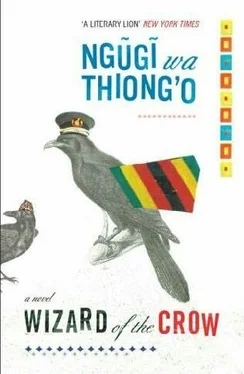Absorbed by what had to be done, he forgot his thirst, hunger, and fatigue. He walked on determinedly, ignoring his surroundings, and paused only when he found himself near the Ruler’s Square. The square was as good a starting place as any, he told himself, and headed toward a public toilet not far from a seven-star hotel. The septic system had collapsed; all the pails were overflowing with human waste. Even the floors were full of shit. Still, the public toilet would be his changing room. In one corner he found space relatively free of shit and piss and went about disguising himself. He opened his bag, took out some rags, and quickly changed. With a felt pen, he drew lines of misery on his face. In no time he had transformed himself from a respectable-looking job hunter to a dire seeker of alms.
Somewhere, bells for the evening Angelus rang, and as if by coincidence the muezzin also started calling the faithful to prayer. For a moment it was as if the two were in competition, the bells intoning Angelus Domini and the muezzin calling out:
Allahu Akba! Allahu Akbar
Ash-hadu an la-llaha illa-Llah
Ash-hadu anna Muhatntnada-r-Rasuwlu-Llah
Hayya ala Swalaah
Hayya alal Falaah…
A good omen, he thought, perhaps the beginning of a reversal of fortune.
It was a good thing that praying and begging were not yet crimes against the state.
Paradise, where Machokali was hosting a welcome dinner for the visiting mission from the Global Bank, was one of the biggest hotels on the Ruler’s Square, famous for the seven statues of the Ruler all in watchful silence, as seven fountains from the mouths of seven cherubs performed a kind of water dance in obeisance to the sculptures. Four statues stood at the corners of the square and showed the Ruler on horseback in different postures, while three at the center depicted him riding a lion, a leopard, and a tiger. The cherubs spouted jets of water into the air in turns night and day. Spots lighted the statues and fountains in the hours of mist and darkness.
One could always tell the origins of the guests at the various seven-star hotels by their different reactions to the statues and fountains: foreign guests would often stop for a minute or two to admire the dance of the fountains and comment; native dignitaries, so used to the scene, would march right through the square without so much as a glance, except when they were in the company of foreigners, in which case they would pause here and there to explain what was unique to Aburlria in the design of the statues, the placement of the fountains, and the choreography of the fountains, not forgetting the significance of the number seven. It’s the Ruler’s sacred number, they would say, as if imparting a secret. And the big cats? a visitor might ask. The Ruler’s totems, they would say solemnly.
It was not much different tonight as guests streamed into Paradise; a few foreigners stopped and made perfunctory remarks as the native majority went straight to the reception area as if afraid of missing out on what had brought them there.
The rumor circulating in the country was that the delegates might actually be bringing a lot of cash to give to the poor; after all, it was not called the Global Bank for nothing. So in addition to invited guests who arrived in chauffeur-driven Mercedes-Benzes and others answering the call of duty, scores of others, barefooted but armed with expectations, waited outside the gates of Paradise for a share of largesse. The crowd camped outside the gates fell into three distinct groups.
The police were there to protect the visitors from any intrusion by hoodlum beggars, but they were under strict orders not to use excessive force. Visiting dignitaries should not be given the impression that Aburlria was awash in conflicts. The image of a country at peace was crucial for wooing finance for Marching to Heaven.
The media were there in great numbers because no matter how one looked at it the entire business was news. No one had ever heard or read, even in the Global Book of Records, of a country asking for a loan for such a project, at least not in recent memory; the only comparable scheme had been in biblical times, but even then the children of Israel had been unable to complete the Tower of Babel. The media had two overriding questions: What did the delegates from the bank think about this revival of a scheme that had proved too much even for God’s own chosen? Would the Global Bank come up with the money?
The third group was actually not alien to these premises. There were always beggars loitering around those kinds of hotels at all hours of day and night. But that night they were there in unusually large numbers, looking for all the world to see like wretchedness itself. The blind seemed blinder than usual, the hunchbacked hunched lower, and those missing legs or hands acted as if deprived of other limbs. The way they carried themselves was as if they thought the Global Bank had come to appreciate and even honor their plight. So they sang, You are the way; we are the world! Help the poor! Help the poor! in different languages because the delegates were assumed to have come from all the corners of the globe. The beggars would occasionally push one another out of the way, but as long as they did not try to break through the cordon around Paradise the police did not interfere. Even when goaded by some, the police remained calm, at least for a while.
But when all the guests entered with “no comments,” the media in the yard became visibly and increasingly restive about the state of equilibrium. News was generated by storms, not doldrums. Some started training their cameras on the beggars with their crutches and deformities. The foreign journalists were particularly interested in the scene, for they believed that a news story from Africa without pictures of people dying from wretched poverty, famine, or ethnic warfare could not possibly be interesting to their audience back home.
Almost as if in answer to the prayers of the media, a group of beggars started shouting slogans beyond the decorum of begging. Marching to Heaven Is Marching to Hell. Your Strings of Loans Are Chains of Slavery. Your Loans Are the Cause of Begging. We Beggars Beg the End of Begging. The March to Heaven Is Led by Dangerous Snakes. This last slogan was chanted over and over.
Many observers agree that the slogans would have elicited nothing more than gentle rebuke from the police but for the mention of the word snakes, all too reminiscent of those snakes that had disrupted the Buler s birthday celebration. The M5 relayed the hostility of the beggars to Sikiokuu, stressing that the hoodlums had said “snakes” not once but repeatedly.
Sikiokuu had been in his office working late yet keeping his ear to the ground, hoping that something would go wrong at Paradise so he could make it look even worse. The news from M5 was not unwelcome. He recalled how the Buler had taken him to task for not acting quickly enough to prevent the disruption of his birthday party. He was determined not to make the same mistake again. He did not even consult the Buler. He gave the orders.
Although they had tried to be stoic and some even aspired to good humor, the police had been chafing under their order of restraint. So they were now jubilant about the business at hand. With their riot gear-clubs, shields, and guns-the police attacked the crowd.
Birds of a feather may flock together in times of peace, but when there is danger each flies alone. A miracle appeared as the beggars dispersed. Those with humps fled upright; the blind could see once again; the legless and armless recovered their limbs as they scurried from the gates of Paradise.
Читать дальше












